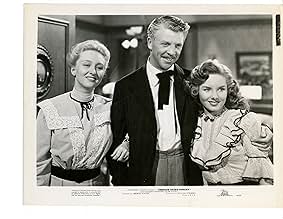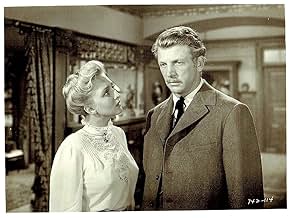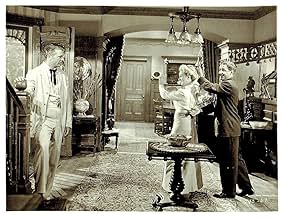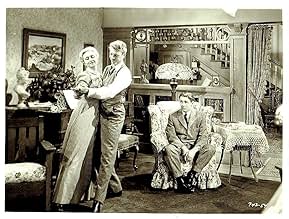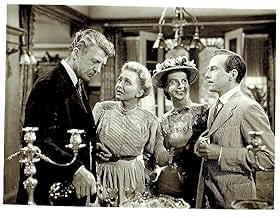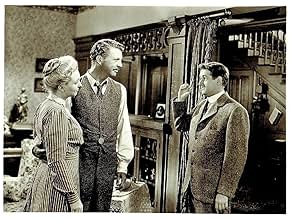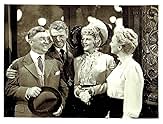Añade un argumento en tu idiomaA rueful wife (circa 1910) recalls 20 years of her husband's financial fumbles, as she keeps a boarding house to support the family.A rueful wife (circa 1910) recalls 20 years of her husband's financial fumbles, as she keeps a boarding house to support the family.A rueful wife (circa 1910) recalls 20 years of her husband's financial fumbles, as she keeps a boarding house to support the family.
- Dirección
- Guión
- Reparto principal
Claude Airhart
- Reverend
- (sin acreditar)
George Beranger
- Jake Barker
- (sin acreditar)
Douglas Carter
- Barfly
- (sin acreditar)
Reseñas destacadas
When the film begins, Emily (Celeste Holm) is visiting with a lawyer, as she wants a divorce from her husband of 20 years. What follows is a long account of their marriage...and why Emily is fed up and finally has had enough. It seems that although Jim (Dan Daily) has a good job as the vice president of the bank, he's always throwing away their money on various get rich quick schemes. None of them ever work out and to make ends meet, Emily turns their home into a boarding house. This makes up the first 10-15 minutes of the story...the rests are about a variety of things, but mostly Jim's schemes. The final one is the last straw, as at this point, they are about to lose pretty much everything because of Jim's stupidity.
On one hand, it's an enjoyable film because the various side stories about the boarders are fun and interesting. On the other, it's not fun watching a louse like Jim...and frustrating. He is a horrible man and it's hard to enjoy the rest of the film because of this. I really think, in hindsight, it would have been better had they softened Jim a bit. As it is, it's a very mixed bag...and the film's message that women should put up with all this...well it's a lousy message. I sure hope folks who watched the film didn't fall for this!
On one hand, it's an enjoyable film because the various side stories about the boarders are fun and interesting. On the other, it's not fun watching a louse like Jim...and frustrating. He is a horrible man and it's hard to enjoy the rest of the film because of this. I really think, in hindsight, it would have been better had they softened Jim a bit. As it is, it's a very mixed bag...and the film's message that women should put up with all this...well it's a lousy message. I sure hope folks who watched the film didn't fall for this!
Based on Rosemary Taylor's memoir of life in turn-of-the-century (i.e., circa 1900) Tucson, the book's subtitle tells much of the story -- "My Life with Mama's Boarders." Rosemary's mother was a practical businesswoman who wasn't above renting out every available square foot of her home to make ends meet. This movie, though, like the book, is a delightful look backward at life in a frontier city in the century's first two decades, featuring Celeste Holm as her mother and Dan Dailey as her more fly-by-night father, who always has a get-rich-quick scheme that, somehow, doesn't pan out. In addition to Dailey (who had several short-lived TV series in the 1970s), later generations will enjoy spotting cast members like Alan Young (quite the rising star in 1948, but remembered now mostly as Wilbur Post from "Mr. Ed" and as the voice of Uncle Scrooge in Disney's "Ducktales"), William Frawley (remembered, of course, from "I Love Lucy" and "My Three Sons"), and ubiquitous character actor Whit Bissell, who appeared in everything from "Star Trek" to "I was a Teenage Werewolf."
This movie is another small gem from director George Seaton and his writing partner, Valentine Davies, who also gave the world the original "Miracle on 34th Street," "The Country Girl," and "The Song of Bernadette." Seaton isn't that well-known today, unfortunately, even though almost everyone has seen at least "Miracle on 34th Street," but like Frank Capra, his movies have a quiet humanity that, even when he used a lighter touch (as here), show Seaton's faith in human resilience. When people say that "they don't make them like they used to," they're talking about movies like this.
This movie is another small gem from director George Seaton and his writing partner, Valentine Davies, who also gave the world the original "Miracle on 34th Street," "The Country Girl," and "The Song of Bernadette." Seaton isn't that well-known today, unfortunately, even though almost everyone has seen at least "Miracle on 34th Street," but like Frank Capra, his movies have a quiet humanity that, even when he used a lighter touch (as here), show Seaton's faith in human resilience. When people say that "they don't make them like they used to," they're talking about movies like this.
Celeste Holm is superb as the center of this film, which is truly sky-high praise for her skills, because the character she plays deserves a sound kick in the pants. She is the wife of an ambitious and relentlessly self-indulgent blow-hard (perfectly cast Dan Dailey) who would be homeless if it were not for her frugality, industry-- and vanity.
Oh, she may not seem vain on the surface, but what other reason could there be for her to stand by, year after year, as her husband fails at get-rich-quick schemes, forcing her to take in boarders to pay the mortgage and support the family. Every time he schemes, she points out the practical problems, only to succumb when he gives her a compliment. Yes, singular. One. One compliment is enough to make her cave every time.
Marriages aren't like that. Flattery does not overcome a daily struggle to make ends meet-certainly not among Western settlers, which these characters purport to be. Which is another problem with this minimally filmed stage play. It tries to be tough-minded but can't raise itself above the sentimental.
Author Rosemary Taylor admits her memoir was mostly fiction. Which, of course, it has to be. What moron would accept this story as fact? Oh, right - Robert Osborne, the round old gent who, before resting in peace, introduced TCM movies. It's not the first time I thought Osborne was Hollywood's original fanboy, with trivia-level knowledge but no original thoughts or insight, let alone an iota of objective critical authority.
Oh, she may not seem vain on the surface, but what other reason could there be for her to stand by, year after year, as her husband fails at get-rich-quick schemes, forcing her to take in boarders to pay the mortgage and support the family. Every time he schemes, she points out the practical problems, only to succumb when he gives her a compliment. Yes, singular. One. One compliment is enough to make her cave every time.
Marriages aren't like that. Flattery does not overcome a daily struggle to make ends meet-certainly not among Western settlers, which these characters purport to be. Which is another problem with this minimally filmed stage play. It tries to be tough-minded but can't raise itself above the sentimental.
Author Rosemary Taylor admits her memoir was mostly fiction. Which, of course, it has to be. What moron would accept this story as fact? Oh, right - Robert Osborne, the round old gent who, before resting in peace, introduced TCM movies. It's not the first time I thought Osborne was Hollywood's original fanboy, with trivia-level knowledge but no original thoughts or insight, let alone an iota of objective critical authority.
It's interesting to see the very mixed reception this 20th Century Fox Americana receives among reviewers. It's very typical of the studio's output around that time--nostalgic, suffused with old, cheap songs, sentimental, and you're never in much doubt as to whether Celeste Holm and Dan Dailey will end up together. They're a loving married couple in turn-of-the-century Tucson, and his frequent get-rich-quick schemes usually end in ruin, but he's popular with the townsfolk. And why wouldn't he be, with Dailey using every ounce of his underrated charm, reveling in private jokes and convincingly playing an errant but very loving husband. Holm rather overdoes her character's quirk of lapsing into Southern accent when asked to charm somebody (she's from an old Dixie family of means), but she completes Dailey as a couple in a way few screen couples do. Unlike some other reviewers, I found this marriage very persuasive and even touching, and though it's not a sterling supporting cast, there are a couple of standouts--Connie Gilchrist, always good for a laugh, is a hoot as a drunken mother-in-law to William Frawley. George Seaton and Valentine Davies intended this as a sort of follow-up to "Miracle on 34th Street," a love story for John Payne and Maureen O'Hara, but both were busy (Natalie Wood wasn't, and has a couple of scenes of cute). It wraps up quickly and not altogether credibly, but emotionally, it's very satisfying.
Faintly ridiculous piece of nostalgic film-flam concerning newlywed couple in early 1900s Tucson; he's the vice-president of the bank and she's the jovial sort of housewife who prides herself on knowing her husband better than he knows himself. Due to the husband's investments and charity, the twosome are forced to take in boarders immediately following their wedding and, as the years progress, their household turns into the neighborhood room-and-board, complete with children of their own. Nothing more than a contract picture for Fox, cheaply-made and cheaply-felt. Valentine Davies and director George Seaton based their script on both Rosemary Taylor's book and the later play by Julius J. and Philip Epstein, which some critics have since compared to the 1970s television series "The Waltons". But even "The Waltons" had a bit of vinegar underneath its homespun scenario; here, beaming wife Celeste Holm plays mommy to her ne'er-do-well hubby, her children, her boarders...she even plays matchmaker for her high-strung daughter and the bashful kid upstairs who can't dance. Natalie Wood appears briefly as one of the tykes, and William Frawley adds some zip as a potential investor in a copper mine, but otherwise this rosy-hued hokum fails to stay the course. *1/2 from ****
¿Sabías que...?
- CuriosidadesWarner Bros. first bought the rights to the novel in 1944 and Mervyn LeRoy was hired as the director. But Warners subsequently sold the property to Fox.
- Citas
Emily Hefferan: There are other homes in town that take in guests.
Rita Kirby: Yeah, I tried 'em all. Those dumps are full too. I mean... nice place you got here.
- ConexionesFollowed by The 20th Century-Fox Hour: The Hefferan Family (1956)
- Banda sonoraWhen You Wore a Tulip and I Wore a Big Red Rose
(uncredited)
Music by Percy Wenrich
Lyrics by Jack Mahoney
Performed by a chorus during the opening credits
Also played at the dance hall
Selecciones populares
Inicia sesión para calificar y añadir a tu lista para recibir recomendaciones personalizadas
Detalles
- Fecha de lanzamiento
- País de origen
- Sitio oficial
- Idioma
- Títulos en diferentes países
- Roligt nästan jämt
- Localizaciones del rodaje
- Empresa productora
- Ver más compañías en los créditos en IMDbPro
- Duración
- 1h 34min(94 min)
- Color
- Relación de aspecto
- 1.37 : 1
Contribuir a esta página
Sugerir un cambio o añadir el contenido que falta

